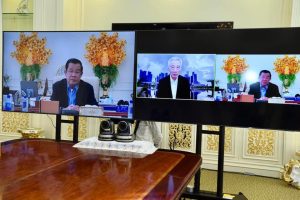Singapore’s Prime Minister Lee Hsien Loong says that there has been no “significant progress” on the implementation of the Association of Southeast Asian Nations (ASEAN) peace plan on Myanmar, calling on the bloc’s current chair Cambodia to include “all parties” in its efforts to mediate the crisis.
Lee made the comments in a call with Cambodia’s Prime Minister Hun Sen, who controversially traveled to Myanmar on January 7-8 for talks aimed at resolving the crisis that has gripped the country since the military takeover last February.
Since taking over the rotating chairmanship of ASEAN late last year, Cambodia’s government has made clear its intention to pursue a policy of pragmatic engagement with the self-appointed military government in Naypyidaw.
This marked a break from the more robust position that coalesced under the leadership of last year’s chair Brunei, which saw the bloc disinvite coup leader Min Aung Hlaing from the ASEAN Summit in October. The bloc took the (for ASEAN) drastic step after months of junta stonewalling on the implementation of ASEAN’s Five-Point Consensus peace plan, which calls (among other things) for an immediate cessation of violence and inclusive political dialogue including “all parties” to the country’s conflict.
In a video call with Hun Sen on Friday, Lee “expressed his view that until there was significant progress in implementing the Five-Point Consensus,” the Singaporean Ministry of Foreign Affairs said in a statement, ASEAN “should maintain its decision” of inviting only a “non-political” representative from Myanmar to attend ASEAN meetings. “Any discussion to revise the ASEAN Leaders’ decision had to be based on new facts,” it said.
According to the Singaporean statement, Lee stressed that the ASEAN chair needs to engage with all parties concerned about the crisis in Myanmar, including representatives of the ousted National League for Democracy (NLD) government. He added that a unilateral ceasefire announced by the junta with ethnic armed groups does not fulfill the Five-Point Consensus’ call for a cessation of violence, given that attacks on civilians and anti-junta militia groups continue to escalate.
Lee’s call came after the Cambodian government postponed a meeting of ASEAN’s foreign ministers scheduled for this week, after some ministers had expressed “difficulties” in attending. The postponement was a likely sign of opposition to the inclusion of the junta-appointed foreign minister, Wunna Maung Lwin, and Hun Sen’s declaration that as a member of the “ASEAN family,” Myanmar’s junta had a right to attend the bloc’s meetings.
Human rights activists and many other observers have criticized Hun Sen’s “cowboy diplomacy” for squandering what little leverage ASEAN had over Myanmar’s military, which has killed at least 1,469 people since the coup, and for allowing the junta to veer the talks away from the framework set by ASEAN’s Five-Point Consensus. For instance, Hun Sen was not granted access to any detained members of the ousted civilian government, nor is it clear that he tried.
Lee’s call with Hun Sen came after several other Southeast Asian nations – including those that pushed hardest for the bloc to bar the junta’s representatives from its meetings – expressed their misgivings about the Cambodian government’s unilateral foray into crisis diplomacy.
According to BenarNews, Malaysian Foreign Minister Saifuddin Abdullah told reporters on January 13 that Hun Sen had the right to visit Myanmar as a representative of his own government, “However, we also feel that because he has already assumed the chair of ASEAN, he could have probably consulted if not all, a few other ASEAN leaders and seek their views as what he should do if he were to go to Myanmar,” he said.
Similarly, Abdul Kadir Jailani, a senior official at the Indonesian Ministry of Foreign Affairs, expressed the hope that “the Cambodian chairmanship can consistently implement what has been agreed [to] in previous ASEAN meetings – the implementation of the Five-Point Consensus – and make efforts to achieve significant progress.” President Joko Widodo has previously said that the junta should not be represented at ASEAN meetings until there is progress on the implementation of the Consensus.
The fourth Southeast Asian government to weigh in was the Philippines. In a statement yesterday, Foreign Minister Teodoro Locsin said that he welcomed Hun Sen’s visit to Myanmar, and paid tribute to the Cambodian leader’s for “bringing to an end the mass murders and suffering” that the country experienced under the Khmer Rouge in the late 1970s. But talks on Myanmar “must include all, not just a select few,” Locsin said, adding that any talks must include ousted leader Aung San Suu Kyi, who has now been sentenced to six years imprisonment (and counting) since the coup.
“Suu Kyi is indispensable in a democratic restoration that will pose no threat of anarchy, dissolution, and civil conflict,” Locsin said.
These statements once again make clear the divisions that persist within ASEAN about how to handle the conflict in its violently errant westernmost member state. This is very likely what has spurred ASEAN’s Secretary General Lim Jock Hoi to make an official visit to Cambodia visit this week, though with a number of Cambodia’s mainland Southeast Asian neighbors actively or passively supportive of its moves in Myanmar, it remains likely that ASEAN’s divisions will continue to complicate its response to the country’s slow collapse.

































